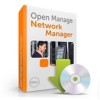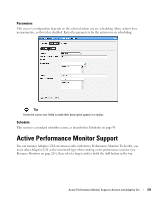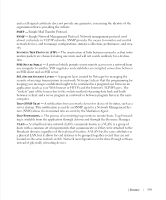Dell OpenManage Network Manager Web Client Guide 5.1 - Page 375
Glossary
 |
View all Dell OpenManage Network Manager manuals
Add to My Manuals
Save this manual to your list of manuals |
Page 375 highlights
Glossary Glossary ACCESS CONTROL - Refers to mechanisms and policies that restrict access to computer resources. An access control list (ACL), for example, specifies what operations different users can perform on specific files and directories. ALARM - A signal alerting the user to an error or fault. Alarms are produced by events. Alarms produce a message within the Alarm Window. API - Application Programing Interface-A set of routines used by the application to direct the performance of procedures by the computer's operating system. AUTHENTICATION - The process of determining the identity of a user that is attempting to access a network. Authentication occurs through challenge/response, time-based code sequences or other techniques. See CHAP and PAP. AUTHORIZATION - The process of determining what types of activities or access are permitted on a network. Usually used in the context of authentication: once you have authenticated a user, they may be authorized to have access to a specific service. COS - Class of Service-Describes the level of service provided to a user. Also provides a way of managing traffic in a network by grouping similar types of traffic. DATABASE - An organized collection of Oware objects. DEPLOYMENT - The distribution of solution blades throughout the domain. DIGITAL CERTIFICATE - A digital certificate is an electronic "credit card" that establishes your credentials when doing business or other transactions on the Web. It is issued by a certification authority (CA). It contains your name, a serial number, expiration dates, a copy of the certificate holder's public key (used for encrypting and decrypting messages and digital signatures), and the digital signature of the certificate-issuing authority so that a recipient can verify that the certificate is real. DOMAIN - A goal-oriented environment that can include an industry, company, or department. You can use Oware to create solutions within your particular domain. ENCRYPTION - Scrambling data in such a way that it can only be unscrambled through the application of the correct cryptographic key. EQUIPMENT - A network device managed by the system. ETHERNET TRUNK - An Ethernet Trunk service represents a point-to-point connection between two ports of two devices. Ethernet frames transported by the connection are encapsulated according to IEEE 802.1Q protocol. The each tag ID value in 802.1Q encapsulated Ethernet frames distinguishes an Ethernet traffic flow. Thus, an Ethernet trunk can aggregate multiple Ethernet VLANs through a same connection which is why "trunk" describes these. | Glossary 375















